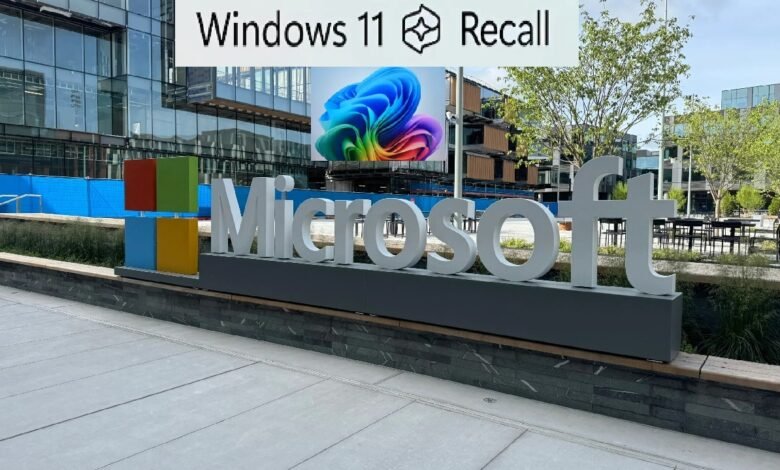New Windows 11 Recall: Powerful Tool or Privacy Nightmare? Captures Every Screen, Powerful Yet Alarming.

Recalling Windows 11: Privacy nightmare or productivity engine? (Privacy issues with Windows 11),New Windows AI Recall
Do you New Windows 11 Recall the tense moment when you were trying to locate the webpage you were just browsing, only to have dozens of tabs taunt you from the screen? “Recall,” a new artificial intelligence tool in Windows 11, is here to help you with your digital memory. It functions by collecting screen captures and storing them in a searchable archive for quick access to previous data. Seems like the realization of a productive utopia? Alright, wait a moment. Although Recall has the potential to improve processes (see Benefits of New Windows 11 Recall), privacy concerns are also being raised by the software (see Windows 11 Recall privacy concerns). Is Recall a useful tool or a privacy mine that is about to blow up?
Imagination You’re handling a million browser windows while knee-deep in design adjustments. Abruptly, catastrophe strikes – you inadvertently close a tab containing important notes. When panic strikes, have no fear! Recall eliminates the need for a digital scavenger hunt by restoring lost information with only a fast search. Not only are designers benefiting from this, but researchers can go back and review important passages in lengthy papers, students can easily remember class notes (Best practices for utilizing new Windows 11 Recall safely), and so on.
Microsoft promises users that privacy is the top priority in Recall. Comparable to a safe digital scrapbook, screenshots are encrypted and kept locally on your device—they never go online. Disabling New Windows 11 Recall gives you the ability to control which websites and programs Recall doesn’t scan, which helps you maintain privacy about your online activities. (Disabling New Windows 11 Recall).
But chances of rub. Some people find the concept of continuous screen capturing unsettling. What type of information is Recall genuinely obtaining? Could it intercept private data, such as bank account numbers or passwords? Although Microsoft promises that anything extremely sensitive will be obscured, some people are still dubious.
In addition, what would happen if your device is lost or compromised? Could the recorded information end up in the wrong hands?
The possible hazards of on-device AI features are brought to light by research conducted by groups such as the Electronic Frontier Foundation (EFF). In order to protect your data, they stress the significance of strong user controls and strong security measures (Can New Windows 11 Recall be hacked?).
So, in this brave new AI world, is it possible for productivity and privacy to coexist?
Of course! To ensure that everyone wins, consider the following strategies:
- What information is stored by Recall should be completely customizable for users (How does Windows 11 Recall protect my privacy?). You should have the power to instruct it to forget particular websites or applications (New Windows 11 Recall vs. conventional search approaches).
- Top-notch encryption techniques should be taken into consideration by Microsoft to further protect that acquired data. Consider it as creating a digital safe for your data.
- It is essential to provide clear and simple information regarding Recall’s operation, the data it gathers, and its intended uses. Consider it similar to the handbook for your electronic memory device.
Independent security audits conducted by respectable organizations may also provide users with additional peace of mind.
Artificial Intelligence is here and is fully embedded into our gadgets. Finding a balance between innovation and user privacy will be crucial as technology develops further (The future of AI helpers in the workplace; The impact of AI on education and learning). Here’s a sneak peek at what could happen in the next few days:
- It is imperative for developers to incorporate strong security and user control into features such as Recall (see How to regulate AI development for user privacy). Consider AI tools that protect your privacy right away.
- It is probable that governments will set explicit regulations governing the development and application of on-device AI capabilities, guaranteeing the protection of your privacy (GDPR and New Windows 11 Recall). Consider it the equivalent of digital highway traffic regulations.
- Users need to know how their data is gathered and used as AI gets more and more ingrained in our daily lives. People can make more informed judgments about the technology they use by participating in educational efforts.
Must I make use of New Windows 11 Recall?
Whether or not you choose to accept Recall ultimately depends on your personal circumstances and degree of comfort. Opting out might be the best course of action if you value complete privacy and are OK with conventional information-gathering techniques (Disabling Windows 11 Recall). However, Recall might be a productivity game for people who value efficiency and believe Microsoft’s privacy guarantees.
The Recall for Windows 11?
So, is Recall in Windows 11 a friend or a foe? It’s still early to tell. Although there is still privacy worry, it has the ability to completely transform the way we work and learn. You have the last say on the matter. Is Recall going to be your virtual benefactor or an unceasing observer?
There’s no denying that AI will always be a part of our daily life. It is incumbent upon users, developers, and policymakers to collaborate going forward. We can successfully traverse this fascinating new territory by emphasizing user control, putting strong security in place, and encouraging education (Best practices for using Windows 11 Recall safely).
Read More:- Surface Pro Copilot+PC vs. Apple Silicon Macs: Powerful But Not Quiet
Global Conversation: AI Concerns
The controversy surrounding the Windows 11 Recall (privacy concerns) extends beyond US borders. Users are speaking out about how to strike a balance between privacy and innovation all over the world. An overview of the discussion that took place overseas is as follows:
Europe: Recall (GDPR and Windows 11 Recall) is being thoroughly examined by the European Union (EU), which has a strong stance on data privacy laws like the General Data privacy Regulation (GDPR). Ensuring user control over data gathering and strong security measures in compliance with EU rules are their main priorities.
India: Users are voicing concerns about the possible exploitation of acquired information in India, where awareness of data security is growing (Data security in India and Windows 11 Recall). There, the main topic of discussion is how crucial it is for Microsoft to communicate clearly about its data storage policies and user control alternatives.
China: Recall’s evaluation will probably be dependent on how well it complies with current policies, as the country has its own set of data privacy laws (Data localization and Windows 11 Recall). Here, the emphasis may be on user control over data sharing with third parties and data localization, or retaining data within China.
This international discussion emphasizes how crucial user privacy is becoming in the AI era.
International cooperation will be essential in developing best practices for user privacy and responsible AI development as technology advances and on-device AI capabilities like Recall become more complex.



